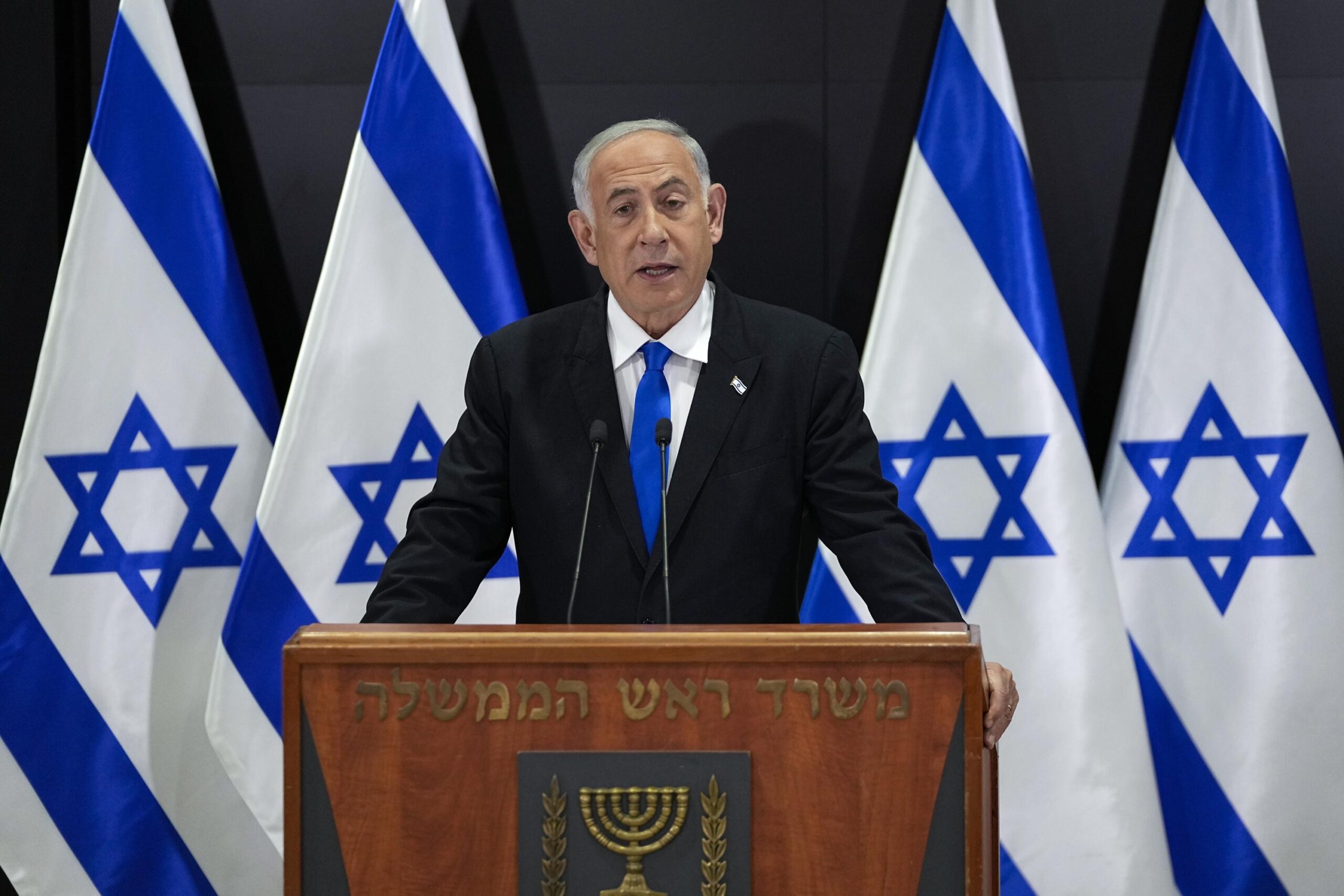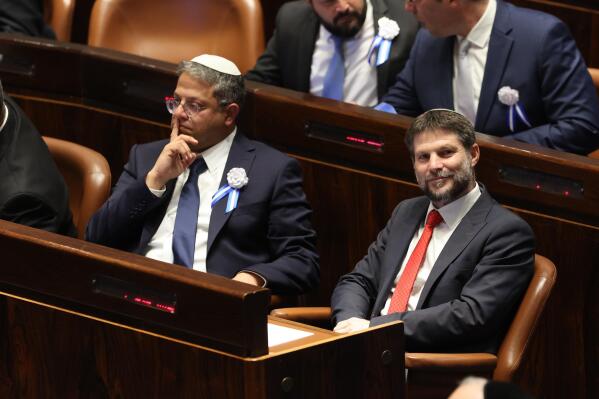|
Getting your Trinity Audio player ready...
|
Edited by: TJVNews.com
Prospects for a cease-fire in Gaza significantly diminished on Monday following declarations from both Israeli Prime Minister Benjamin Netanyahu and Hamas that highlight the widening gulf between the two sides regarding the future of the territory.
According to a report that appeared in the New York Times, a statement released on Sunday night by Prime Minister Netanyahu reaffirmed his uncompromising position, stating that he would only agree to a deal that permits Israel to resume military operations until all the objectives of the war are achieved. “The war must continue until Israel has destroyed Hamas’s military and governing abilities,” Netanyahu emphasized, reiterating his long-held view that a cease-fire is not feasible until Hamas is entirely neutralized.
CNN reported on Monday that members of Netanyahu’s government, whom he relies on to keep his government intact, warned him against making compromises with Hamas.
Minister of National Security Itamar Ben Gvir warned that a negotiated settlement is a “surrender to terrorism on all fronts,” and said “the prime minister conducts himself as a one-man government, making decisions by himself, and excluding his natural partners in the government, including cabinet meetings that are without any significant content,” describing the situation as “intolerable.”
CNN also reported that Finance Minister Bezalel Smotrich, told his party that the proposed outline of a ceasefire deal was a defeat and humiliation for Israel and a victory for Sinwar,” Hamas’ leader in Gaza.

“We will not be part of a deal to surrender to Hamas,” Smotrich said. “The people of Israel, the bereaved families and the IDF fighters demand victory. We must not disappoint them. We must not endanger the country.”
In response, Hamas declared on Monday that Israel’s ongoing military actions across Gaza are jeopardizing the negotiation process. As per the information provided in the NYT report, Hamas insisted that they oppose any cease-fire unless it is permanent, accusing Israel of pushing the negotiations “back to point zero” with its continuous operations.
The Associated Press reported on Tuesday that Israeli forces advanced deeper into the Gaza Strip’s largest city in pursuit of Hamas terrorists who had regrouped there. The report also indicated that Israel issued additional evacuation orders for areas in other neighborhoods of central Gaza City. The military said it had intelligence showing that terrorists from Hamas and the smaller Islamic Jihad group were in the area, and called on residents to head south to the city of Deir al-Balah.
Israel accuses Hamas and other terrorists of hiding among civilians. In Shijaiyah, a Gaza City neighborhood that has seen weeks of fighting, the military said troops raided and destroyed schools and a clinic that had been converted into terrorist compounds.
The AP also reported on Tuesday that Israel and Hamas seem to be the closest they have been in months to agreeing to a cease-fire deal that would pause the fighting in exchange for the release of dozens of hostages captured by Hamas in the Oct. 7 attack that triggered the war.
CIA Director William Burns returned to the region Monday for talks in Cairo, according to Egypt’s state-run Qahera TV, which is close to the security services. An Israeli delegation was also heading to the Egyptian capital, Israeli media reported.
Netanyahu’s insistence on the right to resume fighting has sparked widespread criticism within Israel, where there is growing public support for a cease-fire that would potentially secure the release of Israeli hostages still held by Hamas in Gaza, as was detailed in the NYT report. This public sentiment is putting additional pressure on Netanyahu, whose governing coalition relies heavily on the support of nationalist leaders who are staunchly against any form of permanent truce with Hamas terrorists.

As the conflict in Gaza continues, Israel’s military leadership is increasingly advocating for a cease-fire deal, seeing it as the most effective means of securing the release of approximately 120 Israelis held in Gaza, some of whom are believed to be alive while others are deceased, the NYT reported. Recent polling indicates that a majority of Israelis prioritize the return of these hostages over the continuation of military operations against Hamas.
Efforts to negotiate a cease-fire continued on Monday in Cairo, where Ronen Bar, head of Israel’s domestic intelligence agency Shin Bet, participated in talks mediated by the Egyptian government. Further discussions are scheduled to take place later this week in Qatar, another key mediator between Israel and Hamas. The NYT report observed that despite the hardened public stances from both sides, some officials and analysts suggest these statements may be strategic posturing aimed at strengthening their bargaining positions rather than outright rejections of the negotiating process.
Several critical issues remain unresolved in the negotiations such as the length of the ceasefire. Both sides must agree on the duration of the cease-fire. While Hamas demands a permanent cease-fire, Israel insists on a temporary one that would allow resumption of military operations if necessary.
Another issue that remains unresolved is the number and identity of Palestinian prisoners to be exchanged for the Israeli hostages. Both parties must reach a consensus on this sensitive issue.
The extent of the withdrawal of Israeli troops from Gaza is another critical issue. Hamas calls for a total withdrawal, while Israel seeks to maintain control over certain strategic areas it has captured.
Hopes for a deal were recently revived amid reports that Hamas had shown increased flexibility on several critical points, according to the NYT report. This change prompted Prime Minister Netanyahu to dispatch negotiators to Qatar, signaling a potential breakthrough after months of stalled negotiations.
As the intricate negotiations for a ceasefire-prisoner swap deal between Israel and Hamas continue, new insights from Israel’s Channel 12 journalist Yaron Avraham shed light on the core obstacles hindering progress, as was reported Tuesday on the Israel National News web site. These revelations provide a deeper understanding of the complex dynamics at play and the strategic calculations influencing both sides.
Avraham’s report highlights the nuanced disagreements and agreements between Netanyahu and Defense Minister Yoav Gallant regarding the negotiation process. INN also reported that despite their differences, Netanyahu and Gallant appear to concur on a critical aspect of the negotiations: the potential pitfalls of a protracted, multi-stage negotiation process.
Both leaders agree on the risks of allowing the negotiations to stretch out indefinitely between stages one and two without a clear pathway to resuming military operations if necessary. “Regarding the deal itself, and the tensions between Netanyahu and Gallant, on one thing–to my understanding–they agree, at least,” Avraham noted, according to the report on the INN web site. This shared concern revolves around the fear that prolonged negotiations could leave Israel in a precarious position, unable to reinitiate fighting while most of the hostages remain in Hamas’s hands.
Avraham emphasized the strategic cunning of Hamas leader Yahya Sinwar in the negotiation process. While Hamas has signaled a willingness to negotiate without demanding an immediate end to the war, Sinwar’s tactics have effectively manipulated the negotiation timeline to Hamas’s advantage, as was pointed out in the INN report. By extending the negotiation period, Hamas ties Israel into a complex situation where international pressure, particularly from the United States, insists on continued talks, thereby limiting Israel’s military options.

“There is progress on the one hand from Hamas, which says, ‘I am not demanding an early end to the war,’ but we need to say truthfully, Hamas leader Yahya Sinwar has acted very cunningly, he is attacking the problem from its other end, and simply turning around the timetable and tying Israel into a very problematic place,” Avraham explained.
The role of international actors, especially the United States, as guarantors of the negotiation process further complicates the situation. The insistence on continuing negotiations without reaching concrete agreements places Israel in a bind. As Avraham pointed out, “most of our hostages are in the hands of Hamas, and that’s without discussing our international legitimacy, which will be at zero, because the US will act as a guarantor, [insisting] that the negotiations need to continue,” the INN report said.
Avraham also criticized Israel’s approach to the negotiations, suggesting that more creativity and proactive strategies could be employed. He noted that Israel’s response on Friday was primarily to express opposition to Hamas’s conditions without offering alternative solutions. INN reported that Avraham said, “I agree that Israel could show a lot more creativity, a lot more activeness, to propose other wordings, which did not happen on Friday. Israel only passed its opposition to this section. Let’s hope that this will happen in the coming days.”
On Monday, Israeli Defense Minister Yoav Gallant met with the families of hostages currently held captive by Hamas in the Gaza Strip, according to a report on the Israel National News web site. During this critical meeting, Gallant addressed the families’ pressing questions about the ongoing efforts to secure the hostages’ release and emphasized the defense establishment’s unwavering commitment to exploiting the current opportunities for reaching an agreement.
Minister Gallant reassured the families by underscoring that the return of the hostages is a paramount goal for the defense establishment. “The defense establishment as a whole sees the return of the hostages as a central goal that must be progressed towards, and we must do everything in order to realize the opportunity created at the moment,” Gallant stated, as per the INN report that appeared on Tuesday. He highlighted the importance of leveraging the military pressure applied on Hamas to advance negotiations and seize the current window of opportunity.
Gallant explained that the ongoing military operations have created favorable conditions for moving forward with a hostage release deal. “The military pressure created the conditions that make it possible to move forward with the deal,” he said, as was reported by INN. “The defense establishment will know how to both stop and return to fight anywhere in Gaza as needed. We must take advantage of the military pressure to move the deal forward and not miss it.”
In conjunction with Gallant’s assurances, a high-level Israeli security delegation departed for Cairo on Monday morning to continue negotiations on a potential hostage release deal. INN also reported that the delegation, led by Shin Bet chief Ronen Bar, includes prominent figures such as Dror Shalom, the Ministry of Defense Political-Military Director; Eliezer Toledano, head of the IDF’s Strategy and Third-Circle Directorate; and Ghasan Alyan, head of the Coordinator of Government Activities in the Territories.
Indicated in the INN report was that in a significant political development, opposition leader Yair Lapid addressed the Yesh Atid faction meeting on Monday, urging Netanyahu to prioritize the hostage release deal over his political survival. Lapid’s statements come at a critical juncture as Israel grapples with the aftermath of the October 7 events and ongoing negotiations to secure the release of hostages held by Hamas in Gaza.
Lapid emphasized that Netanyahu does not need to choose between securing the release of the hostages and maintaining his position as Prime Minister. “Let him make the deal. He will receive a safety net from me if Smotrich and Ben Gvir step down,” Lapid declared, as was noted in the INN report. .
Highlighting the urgency of the situation, Lapid stated, “Netanyahu is a bad and failed Prime Minister, and he is to blame for the disaster of October 7, but the most important thing is to return the hostages home,” as was detailed in the INN report. He called attention to the widespread public and parliamentary support for prioritizing the hostages’ return over political maneuvering. “There is a large majority in favor of this among the people and in the Knesset,” he added.
Lapid also questioned the timing and content of Netanyahu’s recent statements, which outlined his stringent conditions for any potential deal. “Why do you issue such statements at such a sensitive and critical moment in the negotiations? What good does that do?” Lapid asked, suggesting that such declarations could undermine the delicate negotiation process currently underway.




